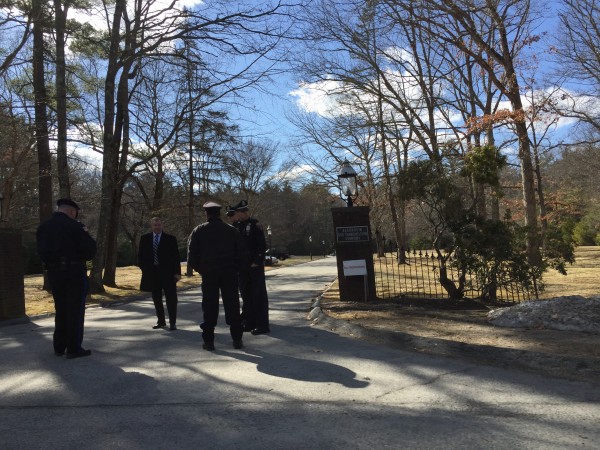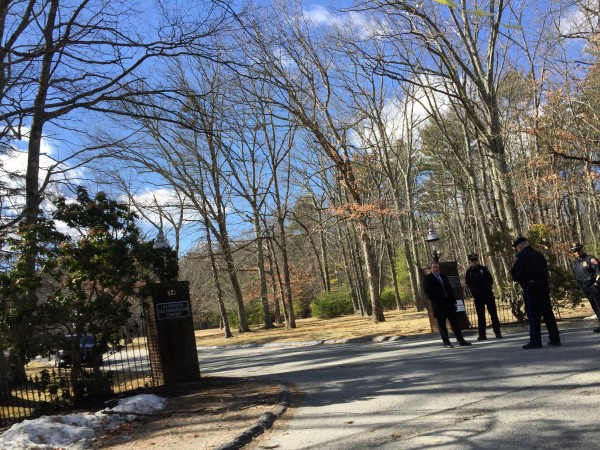 Janet Coit’s visit to the proposed site of Invenergy’s new gas and oil powered energy plant in Burrillville on Monday raises very real questions about what the DEM director calls a “fire wall” that prohibits communication between her and the parties involved in the case she is deciding. In response to my questions, Todd Anthony Bianco, coordinator of the RI Energy Facility Siting Board (EFSB), said:
Janet Coit’s visit to the proposed site of Invenergy’s new gas and oil powered energy plant in Burrillville on Monday raises very real questions about what the DEM director calls a “fire wall” that prohibits communication between her and the parties involved in the case she is deciding. In response to my questions, Todd Anthony Bianco, coordinator of the RI Energy Facility Siting Board (EFSB), said:
“A site visit of the Invenergy property will not violate the Energy Facility Siting Board Rule regarding ex parte communication. All parties were given notice through counsel and have the opportunity to attend. The purpose of the visit is for a Board member to familiarize herself or himself with the area in order to ask informed questions through discovery and during the hearing.”
 Janet Coit, director of the RI Department of Environmental Management, is one of the two people sitting on a three person board (alongside RI Public Utilities Commissioner Margaret Curran) who will ultimately be deciding on whether or not to grant Invenergy permission to build an unneeded, polluting gas and oil burning power plant in Burrillville.
Janet Coit, director of the RI Department of Environmental Management, is one of the two people sitting on a three person board (alongside RI Public Utilities Commissioner Margaret Curran) who will ultimately be deciding on whether or not to grant Invenergy permission to build an unneeded, polluting gas and oil burning power plant in Burrillville.
Anthony Bianco’s explanation that, “parties given notice and hav[ing] the opportunity to attend” is not the legal standard. The correct legal standard was accurately stated by EFSB Chairperson Margaret Curran at the January 29 EFSB Open Meeting: “We are not allowed to discuss anything about this [case] except in public at an Open Meeting.”
What was said to Janet Coit yesterday in the woods in Burrillville was not, in Chairperson Curran’s words, either: (a) in public (the public was not permitted to be present); nor (b) in a formal Open Meeting.
What the public can’t know, and may never know, is:
What exactly this visit was about, what was said at this visit between Director Coit and Invenergy representatives, and whether there was record keeping and documentation of this visit to ensure compliance with the rules regarding ex parte communication. Will the specifics of what is being discussed at the site, outside the public hearing process, be made public? Is there a public record of this event? Why wasn’t the press and public invited to attend this?
In response to these questions, Anthony Bianco sent me the following statement:
“After notice and invitation to the attorneys for all parties, Director Coit, as well as attorneys for some of the parties, visited the Invenergy site in compliance with R.I. Gen. Laws §42-98-13(a) which authorizes member of the siting board to inspect the property where the applicant intends to construct a facility. During that visit, conversation about the matter was to identify where the various components of the facility, the access road and transmission line would be located. Any questions Director Coit may have regarding what she observed during the visit will be asked through the hearing process and made part of the record. Conversations between Chairperson Curran and Director Coit about this matter must be during an open meeting, on the record, and properly noticed. Since the visit did not constitute an open meeting, as only one Board member was present, public notice was not required. Because the site visit took place on private property, only parties to the proceeding were invited. Beyond the parties to the proceeding during this board member’s visit, all decisions regarding access to the property belong to Invenergy and Spectra.”
Before, during and after Director Coit’s visit to the site of the proposed plant, the Burrillville Police Department and other law enforcement officials stood guard to prevent the public and the media from attending. As Anthony Bianco said, “all decisions regarding access to the property belong to Invenergy and Spectra.”
Sure, the site has been the scene of multiple arrests over the last year or so as environmental activists protested the fracked gas infrastructure build up that is threatening the survival of our planet, but the heavy police presence is a sure sign that Invenergy wants to keep the visit as secret as possible. One local opponent of the proposed power plant, a Burrillville resident, informed me that the police followed her to her home that day when she drove by the entrance to the site. This smacks of intimidation, to my mind.
The presence of the police at the site continues a practice seen in Rhode Island before: When the interests of a powerful energy company are questioned by the public, the police become involved, even if there are no laws being broken. National Grid behaved the same way back in August during a public hearing for the Field’s Point LNG expansion.




